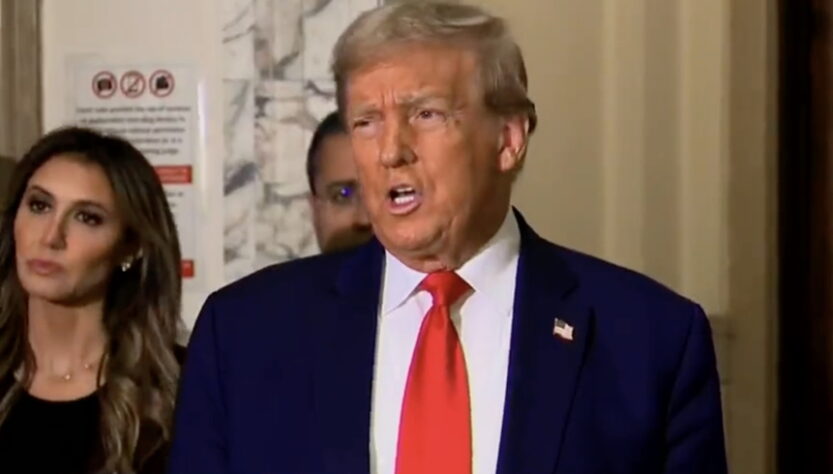A three-judge panel in federal court in Washington, D.C. appeared skeptical of arguments an attorney for Donald Trump made Monday in his appeal of a very narrow gag order imposed by U.S. District Court Judge Tanya Chutkan.
Barely 20 minutes into arguments, former acting U.S. Solicitor General Neal Katyal wrote: “The gag order argument in our nation’s second highest court is … not going well for criminal defendant Donald Trump.” He also described Trump’s layer as “struggling.”
Judge Chutkan’s order prohibits Trump from targeting court personnel, witnesses including potential witnesses, Special Counsel Jack Smith, and his staff.
Minutes into Trump attorney John Sauer’s claims, Judge Bradley Garcia, one of the three judges on the panel, cut in and stated that a court has already overruled one of his arguments: “That court rejected the argument you’re making today.”
At one point another judge pressed attorney Sauer, asking if he were suggesting Donald Trump is above the law. Sauer’s response: “We certainly haven’t argued that.”
READ MORE: ‘Hideous Lie’: White House Condemns Elon Musk’s ‘Abhorrent Promotion’ of Antisemitism
The judge also warned Sauer his suggestion that everything Trump says is political speech may be faulty, that it may not necessarily be political speech. She said what Sauer is calling Trump’s “core political speech” could actually be “political speech aimed at derailing or corrupting the criminal justice process.”
“You can’t simply label it” core political speech.
Later, Judge Garcia said, “We have a past pattern. When the defendant speaks on this subject, threats follow, and now, he’s making similar statements again, we’re months out from the trial. This is predictably going to intensify … Why does the district court have to wait and see, wait for the threats to come?”
At another point, one of the judges told Sauer: “Back in August,” the district court “gave clear warnings to the parties not to make the type of statements that are at issue. That trend continued. And now we have an order that’s targeted at the exact types of statements that have been occurring.”
The judge also reminded Sauer, “A day after he said, ‘if you come after me, I’m coming after you,’ that threat was issued.”
“That evidence is very specific,” the judge pointed out. “As this trial approaches, the atmosphere is going to be increasingly tense. Why does the district court have to wait and see, and wait for the threats to come? Rather than taking a reasonable action in advance?”
At another point, the judge told Sauer, “the conditions of release in this case, prohibit your client from communicating about the facts of the case with any individual known to the defendant to be a witness, except through counsel or in the presence of counsel. Your client signed those conditions of release counsel, before the district court was quite clear that that was not being challenged. How under your analysis, would those conditions of release not be invalid? You’re taking a position that that those conditions of release violate the First Amendment?”
Another damning interaction came when the judge told Sauer, “I’m really trying to understand your legal test. If he were to pick up the phone and call someone that is known to him to be a witness, prospective witness in this case, and speak with that person without counsel present. Would, could, would that violate the restriction?”
“Would the First Amendment protect that communication under your test?” she asked.
READ MORE: Santos Expulsion Resolution Sets Up Test of House GOP Speaker Mike Johnson
“We have not contended –” Sauer replied.
“That is not what I am asking,” she said loudly, almost shouting. “I’m asking you to apply the test that you propose to us because we have to write a test that can be applied, and we have to know how it’s going to be applied. So I’m asking your position, your legal position, would that phone call be protected by the First Amendment or not?”
After some back-and-forth, the judge continued to build her line of questioning.
“Now for next hypothetical,” she said, “he gets on the phone and he says … ‘you’ve always been someone with courage, backbone. A loyalist, a patriot, and, you know, loyalists and patriots don’t talk to prosecutors in my case,’ and hangs up.”
“Okay, if you said that, I think that would be a clear violation of the terms of release,” Sauer agreed.
“Okay,” the judge continued. So [Trump] gets on a stage somewhere, or on social media and says that exact same thing… A public figure is being bothered by the prosecutor. People who are loyal, honest, patriots don’t talk to the government.”
The judge after Sauer insisted Trump had not said that demanded he “answer the question. I’m not suggesting he has said this to be clear. For the record. This is a hypothetical question.”
“Because he’s not speaking directly to the witness. He’s doing this on social media or at a town hall or a news interview, he says that. Does it violate the First Amendment to say that’s prohibited?”
Each side was originally allowed 20 minutes. The court is still hearing arguments 90 minutes in.
Editor’s note: This is a rush transcript.
READ MORE: OnlyFans, Sephora, Botox and Hermes: Report Alleges How Santos Spent Campaign Contributions

